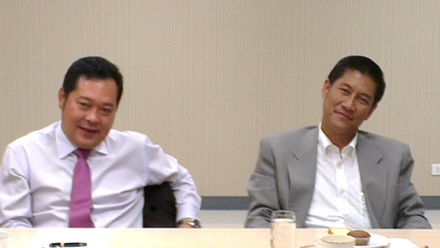BRN to be told to end violence against soft targets in first peace talk
Thai government’s delegation to the first formal peace talk scheduled in Kuala Lumpur on March 28 is expected to raise one issue for discussion with the BRN – that is the de-escalation of violence in the deep South.

Pol Colonel Thawee Sodsong, secretary-general of the Southern Border Provinces Administration Centre (SBPAC) and a member of the delegation, told Isranews Agency that the proposed de-escalation of violence would include no violent attacks against soft targets and innocent people namely teachers, children, women and the elderly and no bomb attacks in towns or densely-populated areas.
As for the BRN side, Pol Col Thawee said that Mr Hassan Taib of the BRN earlier told him that the separatist organization would like the government to lift the emergency decree which has been imposed in all three southernmost provinces with the exception of Mae Larn district of Pattani.
He said that the government was considering replacing the emergency decree with the less restrictive Internal Security Act in areas where violence has subsided satisfactorily.
However, General Prayuth Chan-ocha, the national army chief, has made it clear that emergency decree would not be lifted unless the militants end the violence. He said that it would take about a year before the decree could be removed.
The 15-member working group who will spearhead the peace talk with the rebels is headed by Lt-Gen Paradorn Pattanatabut, secretary-general of the National Security Council.
After the first formal peace talk in KL on March 28 which is expected to take the whole day, sub-groups will be formed to delve into in-depth details about the issues to be discussed with the rebels such as economic and legal issues.
The next 3-6 months after the first peace talk on March 28 are regarded as the confidence-building period during which both parties must carry out actions such as to reduce violent incidents by the militants and to lift emergency decree by the government. Public hearings will also be staged at all levels by the government to create better understanding about the peace process and to allow the public to share their opinions. Similar hearings are also to be held by the BRN.
In the last quarter of the year, both parties are expected to present their conditions for talk. Peace is expected to be restored in 2015 the same year that Asean will turn an economic community.
Lt-Gen Paradorn said that the more the two sides meet, the more mutual trust will be built between them before they start the negotiations in earnest. He admitted that the process would take time but would not be too long and everything could be resolved in two years’ time.
He likened previous peace talks to walking in a maze and going nowhere. The signing of the peace dialogue process with the help of Malaysia as the facilitator constitutes a key which will unlock the maze into the tunnel which has a flicker of light at its end.
An informed source in the working group told Isranews Agency that in the end the issue about a special administrative zone would have to be discussed inevitably although there is a strong opposition to this idea for the time being.
Both Deputy Prime Minister Chalerm Yubamrung and the army chief, General Prayuth Chan-ocha, earlier said they opposed the idea as it contravenes with the Constitution.
The same source said that Sapa-ing Basor who is believed to be the core leader of the BRN would have to be brought in to join the talk. The man is believed to be living in Brunei or Indonesia.
---------------------------------------------------------------------------------------------------------------------
Caption : Pol Colonel Thawee Sodsong and Lt-Gen Paradorn Pattanatabut
